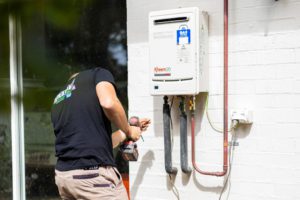When it comes to providing a reliable and energy-efficient source of hot water, gas hot water systems are a popular choice for many households and businesses. These systems offer several advantages, including quick heating, consistent temperature control, and a continuous hot water supply. In this article, we’ll delve into the energy efficiency of gas hot water systems and discuss the importance of proper gas hot water system installation to maximise their efficiency.
Understanding Gas Hot Water Systems
Before we explore their energy efficiency, let’s briefly understand how gas hot water systems work. These systems use natural gas or propane to heat water, stored in a tank or delivered on demand. The key components of a gas hot water system include a burner, heat exchanger, thermostat, and storage tank (in the case of storage systems).
Advantages of Gas Hot Water Systems
Gas hot water systems come with several advantages that contribute to their energy efficiency:
- Rapid Heating: Gas systems heat water quickly, reducing wait times for hot water and minimising energy wastage.
- Continuous Supply: They provide a constant hot water supply, making them suitable for households with high hot water demands.
- Temperature Control: Gas systems offer precise temperature control, allowing users to set their desired water temperature, which can help prevent overheating and energy waste.
- Lower Operating Costs: In many regions, natural gas is more affordable than electricity, resulting in lower operating costs for gas hot water systems.
- Long Lifespan: Gas hot water systems are known for their durability and can last many years with proper maintenance.
Energy Efficiency Ratings
To evaluate the energy efficiency of gas hot water systems, it’s essential to consider their energy ratings. Gas hot water systems are typically rated using two metrics:
- Energy Factor (EF): The EF measures the overall energy efficiency of the system, taking into account factors like standby heat loss, cycling loss, and recovery efficiency. Greater energy efficiency is indicated by a higher EF.
- Uniform Energy Factor (UEF): The UEF is a newer rating that accurately represents a system’s energy performance, especially for tankless or on-demand gas hot water systems.
When choosing a gas hot water system, looking for models with high EF or UEF ratings is advisable. They will consume less energy, lowering utility bills and reducing environmental impact.

Proper Gas Hot Water System Installation
Maximising the energy efficiency of your gas hot water system begins with proper installation. Here are key considerations for a successful installation:
- Sizing: Ensure the system is appropriately sized for your hot water demands. An oversized system can lead to energy waste, while an undersized system may need help to meet your needs.
- Location: The placement of the system matters. It should be installed in a well-ventilated area and away from flammable materials. Sufficient ventilation is necessary for both safe and effective combustion.
- Insulation: Properly insulate the hot water pipes and the storage tank (if applicable) to reduce heat loss during distribution and storage.
- Temperature Settings: Set the thermostat to a temperature that suits your needs without overheating the water. Most households find a temperature of around 120°F (49°C) comfortable and energy-efficient.
- Regular Maintenance: Schedule regular maintenance checks by a qualified technician to ensure the system operates efficiently. This includes inspecting and cleaning burners, checking for leaks, and verifying safety mechanisms.
- Efficient Plumbing Layout: Opt for an efficient plumbing layout that minimises the distance water travels from the heater to the faucets. Shorter pipe runs reduce heat loss.
Additional Tips for Energy Efficiency
Aside from installation considerations, here are some additional tips to enhance the energy efficiency of your gas hot water system:
- Use Low-Flow Fixtures: Install low-flow showerheads and faucets to reduce hot water usage.
- Insulate the Tank: If you have a storage tank system, consider adding an insulation blanket to reduce standby heat loss.
- Tankless Systems: Tankless or on-demand systems only heat water when needed, minimising energy waste from standby heat loss.
- Timers and Smart Thermostats: Install timers or smart thermostats to schedule hot water usage during off-peak hours when gas prices may be lower.
- Regular Maintenance: Don’t skip routine maintenance, as it ensures your system operates efficiently and prolongs its lifespan.
Gas hot water systems are renowned for their energy efficiency and ability to provide a consistent hot water supply. Proper gas hot water system installation, regular maintenance, and smart usage can help you maximise their efficiency while keeping your energy bills in check. Whether you opt for a storage tank or tankless system, choosing a reliable gas hot water service will save you money and contribute to a more sustainable and eco-friendly home.




